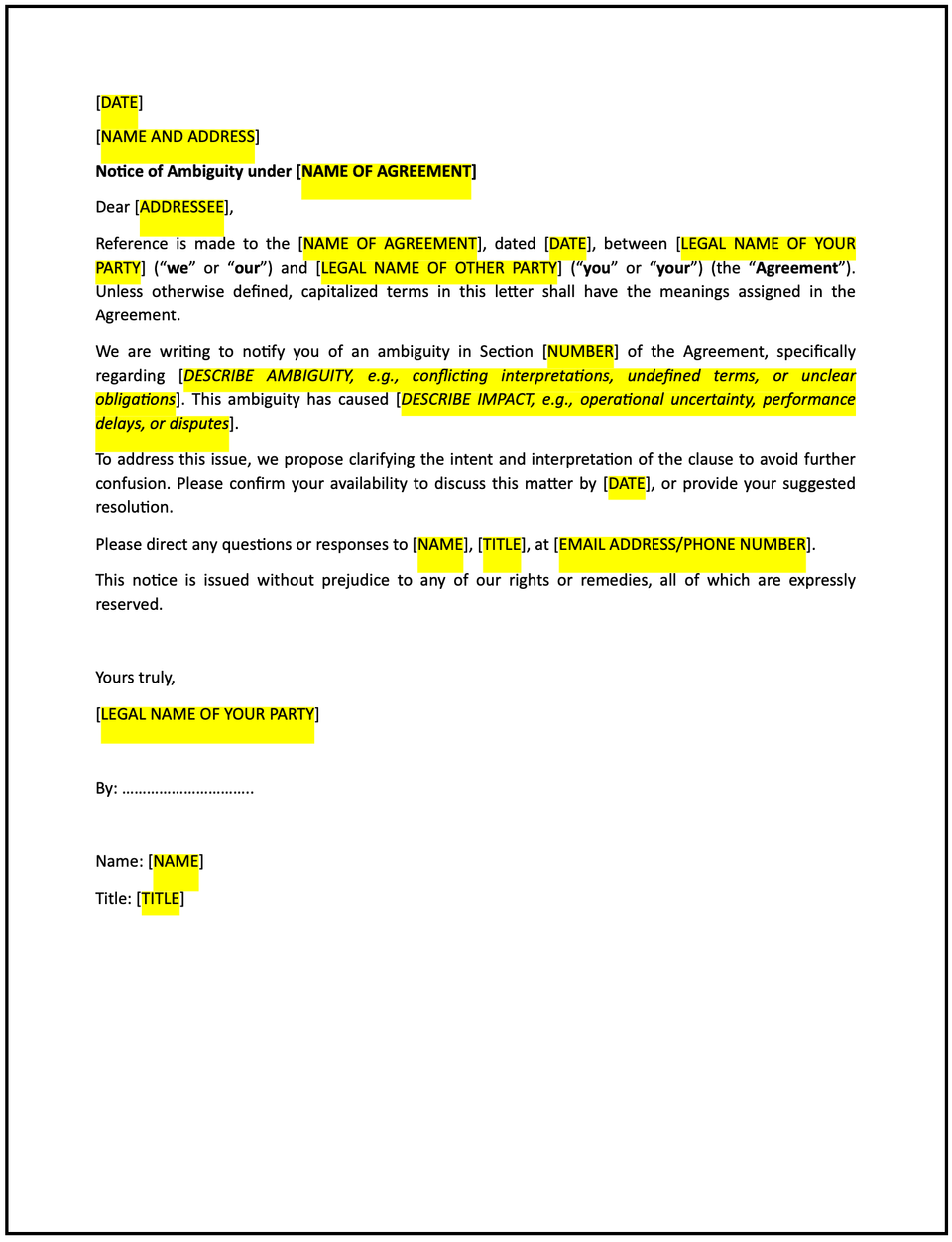Letter of contract ambiguity: Free template

Letter addressing contract ambiguity
Addressing ambiguities in a contract is essential to avoid misunderstandings, clarify terms, and prevent potential disputes. This letter provides a professional way to raise concerns about unclear provisions, propose clarifications, and maintain a collaborative tone to ensure alignment between all parties.
How to use this letter addressing contract ambiguity
- Reference the contract: Clearly identify the contract in question by its title, reference number, and the parties involved. Include the execution date for context.
- Customize the template: Replace placeholders with your organization’s details, the ambiguous sections or terms, and proposed clarifications or questions.
- Specify the ambiguity: Clearly outline the specific clauses or terms that require clarification, referencing section numbers or titles where possible.
- Propose clarifications: Offer potential interpretations or request specific clarifications from the other party to resolve the ambiguity.
- Maintain a collaborative tone: Frame the letter as part of a constructive dialogue, emphasizing the importance of mutual understanding.
- Suggest next steps: Propose a meeting, call, or written confirmation to discuss and finalize the necessary clarifications.
Benefits of using a letter addressing contract ambiguity
This letter template provides a clear and professional way to address unclear contract terms while maintaining a positive working relationship. Here’s how it helps:
- Prevents misunderstandings: Raising ambiguities early ensures all parties are aligned on the contract’s terms and expectations.
- Promotes transparency: The letter demonstrates your commitment to clear communication and collaborative problem-solving.
- Strengthens relationships: Addressing ambiguities constructively reinforces trust and fosters a spirit of cooperation.
- Reduces risk: Clarifying terms minimizes the likelihood of disputes or disagreements later in the contract’s lifecycle.
- Provides a formal record: The letter serves as documentation of your efforts to address and resolve ambiguities in the agreement.
Tips for writing an effective letter addressing contract ambiguity
- Be specific: Clearly identify the ambiguous sections or terms, referencing clause numbers or titles to avoid confusion.
- Propose solutions: Offer potential interpretations or clarifications to guide the resolution process.
- Use professional language: Maintain a respectful and collaborative tone, emphasizing your commitment to mutual understanding.
- Address potential concerns: Anticipate any questions or objections and include explanations to support your points.
- Keep it concise: Focus on the key issues and avoid overloading the letter with unnecessary details or commentary.
Frequently asked questions (FAQs)
Q: What types of ambiguities can this letter address?
A: This letter can address unclear terms, conflicting clauses, undefined responsibilities, or vague timelines within a contract.
Q: Should I propose solutions in this letter?
A: Yes, suggesting interpretations or requesting specific clarifications demonstrates a proactive approach to resolving the ambiguity.
Q: Who typically receives this letter?
A: Send the letter to the other party or parties involved in the contract, typically their legal or operational representatives.
Q: How formal should this letter be?
A: The tone should be professional and collaborative, focusing on resolving the ambiguity constructively.
Q: When should this letter be sent?
A: Send the letter as soon as the ambiguity is identified, ideally before the contract is executed or the ambiguous term is relied upon.
Q: Can this letter address multiple ambiguities?
A: Yes, but organize them clearly, addressing each issue separately to avoid confusion.
Q: Is this letter suitable for contracts already in effect?
A: Yes, this letter is appropriate for addressing ambiguities in both draft contracts and agreements already in force.
This article contains general legal information and does not contain legal advice. Cobrief is not a law firm or a substitute for an attorney or law firm. The law is complex and changes often. For legal advice, please ask a lawyer.


